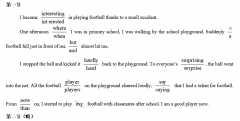揭阳一中、潮州金山中学2016届第一次联考英语试题及答案
2015-2016学年度第二学期高三级正月联考英语科试题
揭阳一中高三备课组 2016.2
第一部分 阅读理解(共两节, 满分40分)
第一节 (共15小题;每小题2分,满分30分)
阅读下列短文,从每题所给的四个选项(A、B、C和D)中,选出最佳选项,并在答题卡上将该项涂黑。
A
I sat with my friend in a well-known coffee shop in a neighboring town of Venice. As we enjoyed our coffee, a man called the waiter and placed his order, “Two cups of coffee, one on the wall.” We got interested and observed that he was served with one cup of coffee but he paid for two. As soon as he left, the waiter attached a piece of paper to the wall saying “A Cup of Coffee.” Similar occasions took place twice while we were there. It seemed that this gesture was quite normal at this place. However, it was something unique and confusing for us.
After a few days, when we again enjoyed coffee there, a man entered. The way this man was dressed did not match the standard or the atmosphere of this coffee shop. Poverty was evident from his looks. As he seated himself, he looked at the wall and said, “One cup of coffee from the wall.” The waiter served coffee to this man with respect and dignity. The man had his coffee and left without paying. We were amazed to watch all this when the waiter took off a piece of paper from the wall and threw it in the dustbin.
Now it was no surprise for us; the matter was very clear. The great respect for the needy shown by people in this town moved us to tears.
Coffee is not a necessity. However, the point is that when we take pleasure in any blessing, maybe we also need to think about those people who also appreciate that specific blessing but cannot afford.
Note the waiter, who gets the communication going between the affording and the needy with a smile on his face. Think about the man in need: he enters the coffee shop without having to lower his self-dignity; he has a free cup of coffee without asking or knowing about who has given this cup of coffee to him; he only looked at the wall, placed an order for himself, enjoyed his coffee and left. Besides, we need to remember the role played by the wall that reflects the generosity and care of people in this town.
1. What made the author interested as well as confused?
A. The waiter’s making normal gestures.
B. Customers’ buying coffee for the needy.
C. The waiter’s attaching coffee orders on the wall.
D. Customers’ paying for coffee and having it put on the wall.
2. The author thought the man in need was ______.
A. obviously poor B. not properly dressed
C. not right to leave without paying D. strange to order coffee from the wall
3. In the author’s opinion, coffee is _____.
A. necessary in our life B. a blessing some can’t afford
C. respect shown for the needy D. a blessing everyone should have
4. The passage is mainly concerned about ______.
A. learning from the waiter B. buying coffee for others
C. caring more about the people in need D. analyzing the characters in the coffee shop
B
Most teenagers in Britain receive pocket money from their parents. A report by the Bank of Scotland interviewed over 1,000 young people in Britain and found that 77% get pocket money. Different families give different amounts of pocket money. The average for eight-to-fifteen-year-olds in the UK is about £6 a week. Children in Scotland receive slightly more than the national average and Londoners get the most. Teenagers, logically, get more money than younger children. Some fifteen-to-nineteen-year-olds receive more than £100 a month. The report found that many children save at least a quarter of their weekly pocket money and that more boys than girls save their money. Lots of young people have to do housework to get their pocket money. They help at home with jobs like cleaning and cooking.
A part-time job is a choice for teenagers who don’t have pocket money or who want to earn extra money. About 15% of teenagers have a job. Popular part-time jobs for teenagers include delivering newspapers, shop work, and working in a restaurant or café. There are strict government laws about working hours. Only children over 13 can work (there are some exceptions, for example, for actors.) On a school day they can work a maximum of 2 hours a day but not during school hours. At weekends and during school holidays they can work longer hours. The national minimum wage for people aged 16-17 is £3.57 per hour. 18-year-olds must earn a minimum of £4.83. There isn’t a national minimum waged for people under 16.
In Britain some children and teenagers have a bank account. There is no legal age limit at which you can open a bank account but a bank manager can decide whether to allow a child or young person to open an account. Parents can put pocket money directly into their child’s bank account and then children can use it to pay for things without carrying money.
Saving or spending pocket money, working part-time and dealing with banks are all parts of the process of becoming a financially independent adult and having to earn and look after your own money.
5. The pocket money for a child in Scotland per week may be _____.
A. £4 B. £6 C. £8 D. £10
6. Which of the following is true according to the passage?
A. More girls than boys save pocket money.
B. Children under 13 are not allowed to work.
C. Most British teenagers have a part-time job.
D. A 16-year-old can work 6 hours on Saturdays.





